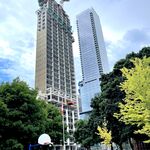My "
proof in the pudding" position....that the average residential condo building is better maintained than the average freehold house, commercial rental building, or public housing. You asked for actual stats, rather than disagreeing, because you know this is true and flies in the face of your assertions.
even buying an old condo doesn't tell you the future of what repairs will be needed and whether the condo board is competent and solvent enough to cover them
Actually, you can plan for what will need fixing/replacing, and that is what condo corps do. There is a level of bureaucracy that comes with condo ownership, and it is there for a reason. But this is a known factor, so if this doesn't suit you, then obviously you don't choose condo ownership in the first place. You can dream up worse-case scenarios for any type of ownership.
because there is almost nothing you can do about it - unlike with a house or a rental.
Of course you can do something about it. Besides being less likely that there's going to be serious issues in the first place (because it is better maintained), you aren't battling a landlord who does not have your best interests at heart.
As for renters "just leaving", well you can't just leave....you may have a fixed term lease agreement which you are legally bound to fulfil regardless of maintenance issues. At the very least, you must give 60 days notice. If things were that bad in a condo, you can also "
just leave"...you can sell a condo within the same amount of time a renter takes to move. The only difference is, that the condo owner is probably going to take a healthy tax free capital gain with him to the next place, whereas the renter faces a rather nasty rental market with nothing to show for his misery.
A freehold home owner doesn't really have any "common area", so the comparison doesn't apply here. But wait....your neighbours are sort of your "common area", as how adjacent property to yours is maintained does affect both your living conditions as well as the value of your property. And you certainly have less "control" over your neighbours than a condo owner has over the common elements of their condo corp.
Yes, condos are a bad type of ownership, because you have ALL of the responsibilities of ownership, but nowhere near the same level of control to solve problems
This is rather silly, because other than cost, the main reason people choose condo living is to escape the responsibilities that go with free hold home ownership. There's no such thing as a bad type of ownership....only ones that don't suit your needs/lifestyle.
So the risk is actually greater.
And here we are again. If this is true, then it should bare out in the evidence. Does it?
If the risk of poor maintenance is higher in condo buildings, than the average condo building should be in worse condition than any other form of residential real estate. The opposite appears to be the case (it's self-evident, so please don't take the position that you want to see an official survey, cause that is just insulting our intelligence).
For the record, highrise apartment condos are not my first choice for investment for
ME (although I have owned 3 in the past).




